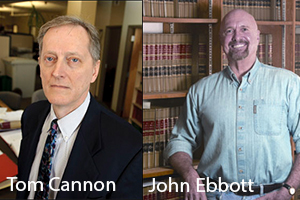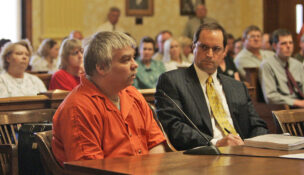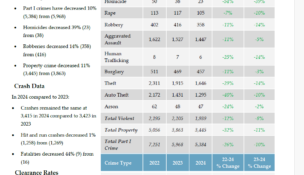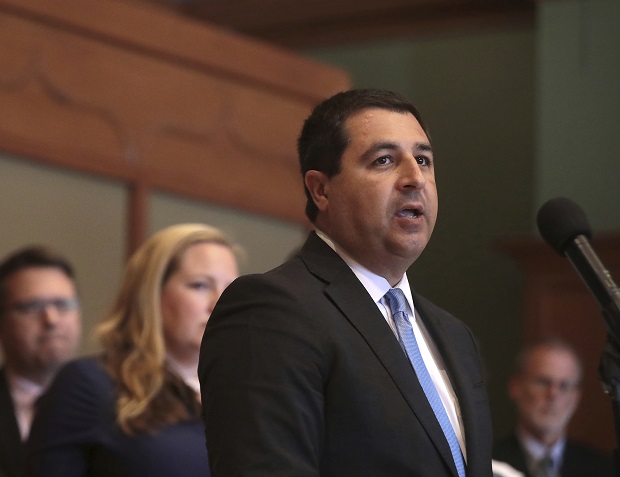Ebbott and Cannon ‘would not compromise’
By: Eric Heisig//December 13, 2013//
 John Ebbott is stepping down from his role leading Legal Action of Wisconsin Inc., but his passion for equal representation remains strong.
John Ebbott is stepping down from his role leading Legal Action of Wisconsin Inc., but his passion for equal representation remains strong.
Ebbott went to the University of Wisconsin Law School at the height of the civil rights era and protests for the Vietnam War. That inspiration, along with an example set by his parents at an early age, pushed him to stand up for what he believed in: that those less fortunate should have the same legal rights as those who could afford legal representation.
The Milwaukee attorney has been involved in Legal Action, in some capacity, on and off since 1970, when he started with one of its predecessors, Freedom Through Equality Inc. He has been the nonprofit’s executive director since 1990.
This week he announced he will retire in June.
“There comes a time,” Ebbott said, “you just kind of know you’re mind’s good enough to let me know that I need to retire at this.”
Legal Action’s Board of Directors is expected to start searching for a new executive director in the coming weeks. Ebbott said he most likely will not be involved in the process.
Ebbott will be joined in retirement by his friend and fellow longtime advocate for the poor: Tom Cannon, executive director of Legal Aid Society of Milwaukee Inc. Cannon told his nonprofit’s Board of Directors on Wednesday that he would step down in September.
Ebbott’s and Cannon’s organizations have worked together on several cases, and the two often collaborated on advocating for more public money to dedicate to civil legal aid. The two men are both sponsors of a rule petition pending in front of the state Supreme Court to start a civil Gideon program in Wisconsin. A similar proposal was shot down last year.
Ebbott insisted that the timing of their retirement announcements was coincidence, and he referred to Cannon as a “brother to me since he came in as executive director.”
“These two guys carried the banner for many years,” said Jim Temmer, executive director of the Milwaukee Bar Association. “It’s up to the rest of us to build on the good work that they’ve done.”
Their no-nonsense, take-it-or-leave-it style, though, often could be intimidating, some said.
Ebbott and Cannon rarely would budge on the issue of full representation for the poor when talking about civil legal services. Other options, such as reduced fees to advice clinics, never quite did the job well enough for them, said Mike Gonring, an attorney with Quarles & Brady LLP and a fellow civil legal services advocate.
Gonring described both of them as tireless advocates, and said “that fire” they have for their work “caused other people to back off.”
“Every movement needs that sort of thing, people who won’t compromise,” Gonring said. “All they were interested in was full legal representation.”
Ebbott, for his part, said that belief – which he has fought hard to advocate for during his time – comes from that early belief that the poor should get the same representation as the rich. A well-off client would never just accept a “pinch” of advice, he said.
“To give everyone a pinch of advice and nobody full representation … it’s not equal justice under the law,” he said. “There is no justice to me when a litigant is on his own.”
Ebbott said he plans to spend his retirement writing a book on Legal Action’s history, as well as working on a novel about Chief Black Hawk.
He said he is confident there are others that can do the work he and Cannon will leave behind.
But he also knows it’s a challenging time for civil legal services. The state’s current biennial budget contains no money for civil legal services, despite a growing need.
The best way to power through that, Ebbott said, is to try to block it out and continue to work, since the need is always there.
“You can’t do this work without kind of ignoring that,” he said of the lack of money to support the work. “When I started at Freedom Though Equality, none of us thought we would have that job for a year.” Follow @eheisigWLJ
Legal News
- Steven Avery prosecutor Ken Kratz admits ‘mistakes were made’
- Colombian national extradited to Milwaukee faces International narcotics-trafficking conspiracy charge
- MPD: Milwaukee homicides down nearly 40 percent compared to last year
- EVERS: Republican lawmakers No-Show at special meeting to release statewide PFAS funding, stabilize healthcare access
- Wisconsin ICAC Task Force conference on Missing and Exploited Children highlights increase in sextortion cases
- More than 300 Wisconsin officers back in law enforcement after being fired or forced out
- Former Trump staffer who said to ‘fan the flame’ after 2020 loss hired to lead Wisconsin GOP
- Gov. Evers appoints David Casey to Serve as DOR Secretary
- Former Marine sentenced for Molotov Cocktail attack against Planned Parenthood Clinic
- ABA names 34th Annual Margaret Brent Women Lawyers of Achievement Awards honorees
- FBI launches criminal investigation into Key Bridge collapse
- Man charged in slaying after woman’s leg found at Milwaukee-area park
WLJ People
- Power 30 Personal Injury Attorneys – Russell Nicolet
- Power 30 Personal Injury Attorneys – Benjamin Nicolet
- Power 30 Personal Injury Attorneys – Dustin T. Woehl
- Power 30 Personal Injury Attorneys – Katherine Metzger
- Power 30 Personal Injury Attorneys – Joseph Ryan
- Power 30 Personal Injury Attorneys – James M. Ryan
- Power 30 Personal Injury Attorneys – Dana Wachs
- Power 30 Personal Injury Attorneys – Mark L. Thomsen
- Power 30 Personal Injury Attorneys – Matthew Lein
- Power 30 Personal Injury Attorneys – Jeffrey A. Pitman
- Power 30 Personal Injury Attorneys – William Pemberton
- Power 30 Personal Injury Attorneys – Howard S. Sicula











